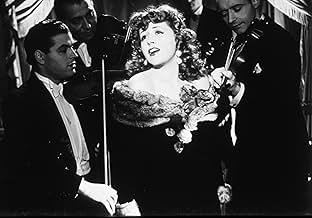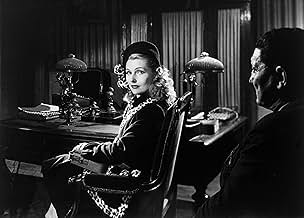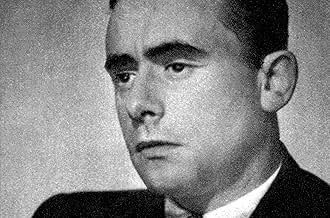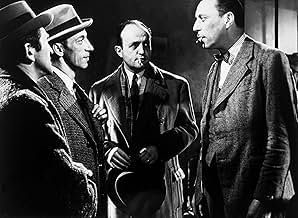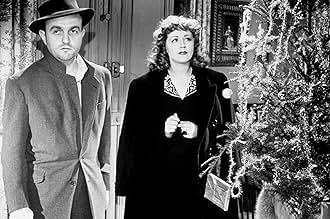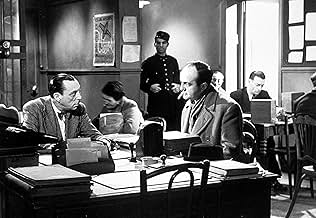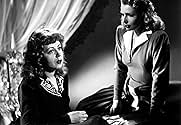AVALIAÇÃO DA IMDb
7,7/10
6,6 mil
SUA AVALIAÇÃO
Adicionar um enredo no seu idiomaA jealous husband intends to kill the man his wife is meeting for business, but arrives to find the deed already done.A jealous husband intends to kill the man his wife is meeting for business, but arrives to find the deed already done.A jealous husband intends to kill the man his wife is meeting for business, but arrives to find the deed already done.
- Prêmios
- 2 vitórias e 1 indicação no total
Henri Arius
- Léopardi
- (as Arius)
Charles Blavette
- Le gendarme Poitevin
- (as Blavette)
René Blancard
- Le commissaire principal de la P.J.
- (as R. Blancard)
Robert Dalban
- Paulo
- (as R. Dalban)
Jean Daurand
- L'inspecteur Picard
- (as J. Daurand)
Jean Dunot
- Nitram
- (as J. Dunot)
Jacques Grétillat
- Auguste
- (as J. Grétillat)
Gilberte Géniat
- Mme Beauvoir
- (as G. Géniat)
Gabriel Gobin
- Le patron du bistrot
- (as G. Gobin)
François Joux
- L' officier de police Fayard
- (as F. Joux)
Enredo
Você sabia?
- CuriosidadesHenri-Georges Clouzot wrote almost two-thirds of the film only having read the novel years before, recalling it from memory, since it was out of print by the time he started the screenplay. When the novelist Stanislas-André Steeman saw the film, he was furious about the differences between the novel and the film.
- Erros de gravaçãoWhen Antoine is repeating Maurice's deposition to the typist, he says that the confrontation between Maurice and Brignon at the restaurant took place on Wednesday, December 2, 1946. In 1946, December 2 fell on a Monday.
- Citações
L'inspecteur adjoint Antoine: I have to admit, I've taken a liking to you, Miss Dora Monier.
Dora Monier: Me?
L'inspecteur adjoint Antoine: Because I have to say, you're just my type. When it comes to women, we'll never have a chance.
- ConexõesEdited into Histoire(s) du cinéma: La monnaie de l'absolu (1999)
Avaliação em destaque
Quai des Orfèvres is directed by Henri-Georges Clouzot and Clouzot co-writes the screenplay with Jean Ferry. It is based on the novel Legitime defense written by Stanislas-André Steeman . it stars Louis Jouvet, Suzy Delair, Bernard Blier and Simone Renant. Music is by Francis Lopez and cinematography by Armand Thirard.
When high profile business man Georges Brignon is found murdered all evidence points to jealous husband Maurice Martineau - Inspector Antoine takes up the case.
Following the backlash and fallout from Le Corbeau in 1943, Henri-Georges Clouzot wasn't allowed to make a film for four years, his return brought about Quai des Orfevres. Although a highly respected master of his craft, Clouzot was frowned upon for the dark approach to human nature in some of his films, whilst his treatment of the actors under his direction is legendary in a bad way. So how interesting to find that his comeback picture is actually one of his most accessible, very much thriving on human interest factors for literally everyone in the picture!
This a traditional police who done it procedural in core essence, one that does come with coincidences and contrivances, and yet the characters are so richly drawn, their lives so compelling, that the simplicity of plot is actually irrelevant. We are in post war Paris and the back drop is the world of theatre and nightclubs. Clouzot offers up in the fist instance some film noir staples, a possible femme fatale, gay love from afar, cuckold husband and a grotesque murder victim. Even the acts on the stage have a weirdness to them, Wheeling Winos - one with a paper mache head! Dogs that walk on their hind legs! How wonderful. The clubs are smoky, the streets dimly lighted for menacing atmosphere, Clouzot and Thirard have created a splendid moody world from which to spin the tale.
I'll take him for a ride, and what a ride!
Pitched at the front is Jenny Lamour (Delair), who is not beyond using her sexuality to further her stage career, which of course doesn't sit well with her highly jealous husband Maurice (Blier), a man clearly punching above his weight with Jenny. Ah but Clouzot is a crafty devil, he has let us into a secret that undermines us the viewer's expectations and that of Maurice. This keeps the question of who is the murderer - and the motive - as a constant intrigue. There's little slices of sexy sauce to tantalise, and the whole play developes into a sort of tragic comedy, but always the characterisations of the key players are earthy and dealing in foibles. Then Inspector Antoine (Jouvet excellent) holds court, a grumpy but stoically deceptive man of his work, film noir has itself another policeman of note.
Visually there's some treats, such as the dark shadowy walk that Maurice takes to Villa St Marceaux, arriving at the house which instantly looks like a noir nightmare. Better still is a sequence as we get towards the denouement, Maurice in a holding pen, a sexy lady in the pen next door, as bells ring out she is framed in shadowed bars whilst Maurice's mind begins to fracture. The craft on show is sublime at times, visually and on the page. I'm not over enamoured with Delair as an actress, but conversely Renant is quality and gorgeous into the bargain, while I think the ending should have really gone into black hearted territory. All told though, and this is Clouzot's least suspenseful film that I have seen, this is well worthy of time investment for lovers of classic French cinema. 7.5/10
When high profile business man Georges Brignon is found murdered all evidence points to jealous husband Maurice Martineau - Inspector Antoine takes up the case.
Following the backlash and fallout from Le Corbeau in 1943, Henri-Georges Clouzot wasn't allowed to make a film for four years, his return brought about Quai des Orfevres. Although a highly respected master of his craft, Clouzot was frowned upon for the dark approach to human nature in some of his films, whilst his treatment of the actors under his direction is legendary in a bad way. So how interesting to find that his comeback picture is actually one of his most accessible, very much thriving on human interest factors for literally everyone in the picture!
This a traditional police who done it procedural in core essence, one that does come with coincidences and contrivances, and yet the characters are so richly drawn, their lives so compelling, that the simplicity of plot is actually irrelevant. We are in post war Paris and the back drop is the world of theatre and nightclubs. Clouzot offers up in the fist instance some film noir staples, a possible femme fatale, gay love from afar, cuckold husband and a grotesque murder victim. Even the acts on the stage have a weirdness to them, Wheeling Winos - one with a paper mache head! Dogs that walk on their hind legs! How wonderful. The clubs are smoky, the streets dimly lighted for menacing atmosphere, Clouzot and Thirard have created a splendid moody world from which to spin the tale.
I'll take him for a ride, and what a ride!
Pitched at the front is Jenny Lamour (Delair), who is not beyond using her sexuality to further her stage career, which of course doesn't sit well with her highly jealous husband Maurice (Blier), a man clearly punching above his weight with Jenny. Ah but Clouzot is a crafty devil, he has let us into a secret that undermines us the viewer's expectations and that of Maurice. This keeps the question of who is the murderer - and the motive - as a constant intrigue. There's little slices of sexy sauce to tantalise, and the whole play developes into a sort of tragic comedy, but always the characterisations of the key players are earthy and dealing in foibles. Then Inspector Antoine (Jouvet excellent) holds court, a grumpy but stoically deceptive man of his work, film noir has itself another policeman of note.
Visually there's some treats, such as the dark shadowy walk that Maurice takes to Villa St Marceaux, arriving at the house which instantly looks like a noir nightmare. Better still is a sequence as we get towards the denouement, Maurice in a holding pen, a sexy lady in the pen next door, as bells ring out she is framed in shadowed bars whilst Maurice's mind begins to fracture. The craft on show is sublime at times, visually and on the page. I'm not over enamoured with Delair as an actress, but conversely Renant is quality and gorgeous into the bargain, while I think the ending should have really gone into black hearted territory. All told though, and this is Clouzot's least suspenseful film that I have seen, this is well worthy of time investment for lovers of classic French cinema. 7.5/10
- hitchcockthelegend
- 1 de jun. de 2019
- Link permanente
Principais escolhas
Faça login para avaliar e ver a lista de recomendações personalizadas
- How long is Jenny Lamour?Fornecido pela Alexa
Detalhes
- Data de lançamento
- País de origem
- Central de atendimento oficial
- Idioma
- Também conhecido como
- Jenny Lamour
- Locações de filme
- Paris, França(Exterior)
- Empresa de produção
- Consulte mais créditos da empresa na IMDbPro
Bilheteria
- Faturamento bruto nos EUA e Canadá
- US$ 180.974
- Fim de semana de estreia nos EUA e Canadá
- US$ 9.632
- 27 de out. de 2002
- Faturamento bruto mundial
- US$ 181.041
- Tempo de duração1 hora 46 minutos
- Cor
- Proporção
- 1.37 : 1
Contribua para esta página
Sugerir uma alteração ou adicionar conteúdo ausente

Principal brecha
By what name was Crime em Paris (1947) officially released in Canada in English?
Responda
![Assistir a Bande-annonce [OV]](https://m.media-amazon.com/images/M/MV5BMmI1MGQ3ZWItMWI3Yi00M2RhLTkwMzEtODUyZWE5NmVhZGRlXkEyXkFqcGdeQXRyYW5zY29kZS13b3JrZmxvdw@@._V1_QL75_UX500_CR0)
